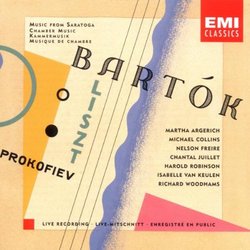| All Artists: Bela Bartok, Franz Liszt Sergei Prokofiev, Michael Collins, Chantal Juillet Martha Argerich Title: Martha Argerich ~ Bartok - Contrasts · Prokofiev - Quintet Op.39 · Liszt - Concerto Pathétique Members Wishing: 0 Total Copies: 0 Label: Angel Records Original Release Date: 1/1/1998 Re-Release Date: 6/29/1999 Album Type: Original recording reissued Genre: Classical Styles: Chamber Music, Forms & Genres, Concertos, Historical Periods, Classical (c.1770-1830), Instruments, Keyboard Number of Discs: 1 SwapaCD Credits: 1 UPC: 724355703521 |
Search - Bela Bartok, Franz Liszt Sergei Prokofiev, Michael Collins, Chantal Juillet Martha Argerich :: Martha Argerich ~ Bartok - Contrasts · Prokofiev - Quintet Op.39 · Liszt - Concerto Pathétique
CD Details |
CD ReviewsMarketing Mayhem Dr. Christopher Coleman | HONG KONG | 10/24/2000 (5 out of 5 stars) "Well, here's a very interesting bit of marketing--this CD, released in Hong Kong, does not contain the Prokofiev performance. Same cover, same performers, slightly different programme. Instead, the Kodaly Duo for violin and cello is included, in a stunningly wonderful performance. Programming concerns make the Hong Kong choice much more interesting--the parallels between the three Hungarian composers who don't, at first glance, seem to quite belong together, provoke thought from the audience. Bartok, Liszt, and Prokofiev--I wonder what the programming concept really is here, other than the not terribly profound Eastern European connection. Bartok, Kodaly, and Prokofiev would have made sense as three contemporaneous composers.The Bartok work included is his three-movement suite for violin, clarinet and piano called Contrasts, which he wrote for himself, a violinist friend Josef Szigeti, and the American jazz clarinettist Benny Goodman. This piece hints at developments later in Bartok's career; for example, the chorale writing in the second movement and the swirling texture of scales in close imitation in the third. Both these ideas are developed much further in Bartok's Concerto for Orchestra. One wonders what Benny Goodman made of this. He also commissioned Stravinsky to write the Ebony Concerto for Clarinet and Jazz Band--and frankly neither of these pieces are really the composer's best work. The Bartok, as enjoyable as it is, has small ambitions. I rather think that Goodman was hoping for something more like Rhapsody in Blue. That said, though, this is a terrific performance, rhythmic and energetic and exciting. It is much more musical, in fact, than the recording that Bartok himself made with Goodman and Szigeti.The Liszt Concerto pathetique is something else altogether. While the Bartok has small ambitions, this piece aims high. So high, in fact, that it exists in four different versions--one for solo piano, the one presented here for two pianos, and two arrangements for piano and orchestra; all prepared by Liszt himself. This is the Liszt we know and love, a forward-looking composer unafraid to engage in bombast and pathos when necessary--but so thrilling and emotional for just that reason. Although I can't speak to the performance of the Prokofiev, I highly recommend the performances of the Bartok and Liszt." Curious programming overcome by great performances Robert Buchanan | Wisconsin | 03/10/2008 (4 out of 5 stars) "Like most of his works, Kodály's "Duo" for violin and cello is imbued with the spirit and style of Hungarian folksong, adapting the erratic intonation and thematic idiosyncrasies of this unique music to convey an enormous emotional range...while never actually quoting any folk melodies. The influences of Bartók's "Contrasts" for violin, clarinet and piano are also exclusively Hungarian, but his influences are taken from a trio of sources: military recruitment and folk dances, as well as the lush atmosphere of nocturnal environments. Both of these compositions are, like the men who scribed them, brilliant in their invention and thoroughly Magyar.
Liszt's "Concerto pathétique" is also a composition that could have been penned by no one other than its' conductor, which makes its' inclusion on this disc decidedly incongruous. Despite his nationality, Liszt was no educated man's example of a Hungarian, and his works emphasize this fact: notable for their advancement of Teutonic convention and bombast, they are surely as German as the man's own lineage. This isn't to say that the "Concerto pathétique" - evaluated either on its' own merits or as a grandiose reworking of the composer's own "Grosses Konzertsolo" - isn't a very fine piece, even by Liszt's own standards of composition. But there is nothing Hungarian about it, and this makes the tone of this disc oddly uneven while reminding us that unfortunately, only two truly Hungarian composers ever obtained worldwide renown. The efforts of the Saratoga Performing Arts Center to commit its' shows to disc via EMI are commendable and these live performances really are first-rate, but whoever programmed this album might have considered how lopsided the thing sounds as a whole. Quibbles aside, this music is as expertly played as the recognizable names on the album's cover would imply. The trio consisting of Juillet, Collins and Argerich are especially engaging through the "Sebes" movement of Bartók's "Contrasts;" here, they almost seem to perform as one. Fans of Argerich and/or Freire may not find this to be an ideal purchase unless they're completest collectors of the output of one or both of these legendary pianists. Argerich is relegated to the periphery throughout the first two movements of "Contrasts" and is never highlighted through the course of the piece, and while the "Concerto pathétique" is a magnificent and rigorous work, it almost seems mild in comparison to Argerich and Freire's usual selections." |


 Track Listings (7) - Disc #1
Track Listings (7) - Disc #1